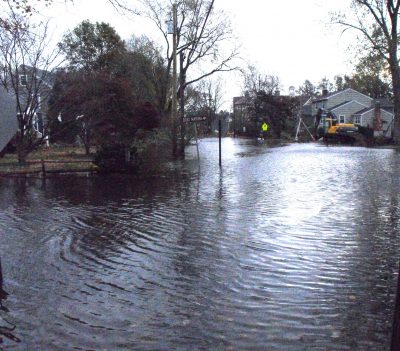
Aging residents of underserved groups in Stamford, West Haven and New London will be better equipped to recover from the effects of severe weather events that cause flooding, power outages and other impacts to their communities, thanks to a project led by Connecticut Sea Grant and UConn Extension.
The project to fill the emergency preparedness gap for older underserved populations has been awarded $198,126 in federal funds by the National Oceanic and Atmospheric Administration’s Office Response and Restoration and the National Sea Grant College Program. The award was announced Aug. 8 along with three other disaster preparedness and response programs, in Alaska, the Northern Gulf of Mexico and South Carolina. All four awards totaled $791,395.
In the Connecticut project, the team will develop partnerships, tools and resources to use in emergency preparedness programming and training pilots Stamford, West Haven and New London. Instructions, supplies and companionship/ambassador training in support of aging residents and their caregivers will help ensure that they are properly equipped ahead of weather events.
The project will begin in October by identifying and supporting current and anticipated preparedness needs of this population, then develop a system of long-term preparedness support for aging community members that can be expanded to other coastal communities.
“We are thrilled to receive this funding,” said CT Sea Grant Associate Director Nancy Balcom, who will lead the project with four colleagues from UConn Extension and two from the UConn Anthropology and Communications departments. “It will enable us improve our understanding of the needs and concerns of older, vulnerable adults and their caregivers related to disaster prepardness and coastal resilience. Using these insights, we will then develop tools and resources to use in outreach programs and training activities to help build a greater sense of security and confidence through better preparation for coastal storms and other disasters.”
This is the third year in a row that NOAA’s OR&R has announced awards to ensure that coastal communities are better equipped to move through the preparedness cycle efficiently, safely and effectively. Each of the four projects takes an individualized and localized approach to disaster preparedness.
“The Disaster Preparedness Program is pleased to continue to support these projects in vulnerable coastal communities,” said Kate Wheelock, director of OR&R’s Disaster Preparedness Program. “While we cannot prevent disasters from happening, we can attempt to reduce their impacts. We believe these projects will provide the public with the additional resources needed to mitigate the impacts of potential coastal disasters.”
Located at UConn’s Avery Point campus in Groton, Connecticut Sea Grant is one of 34 Sea Grant programs supported by the National Oceanic and Atmospheric Administration in coastal and Great Lakes states that encourage the wise stewardship of our marine resources through research, education, outreach and technology transfer. UConn Extension works to connect the public with research and resources.